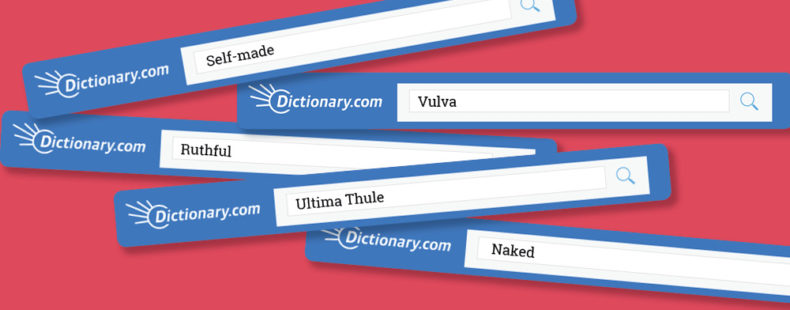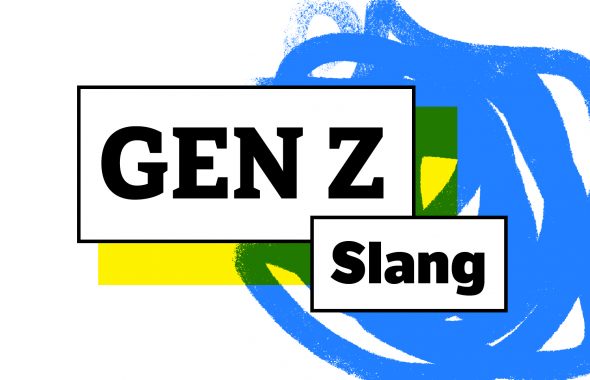We’re only a quarter of the way through 2019, but already we’ve seen some significant trends in searches on Dictionary.com. Politics, as ever, has propelled many of the lookups, but that’s not the only driver. Sneak peek: Top terms range from pad thai to deep space.
Here are the words setting the search trends through March 2019:
1. Exonerate
Our top lookup in early 2019 is exonerate, “to clear, as of an accusation; free from guilt or blame.” The word comes from a Latin verb joining the prefix ex-, “out of,” and onus, “burden.” It originally meant “to relieve (someone) from a burden” in English.
Searches for exonerate surged 5, 182% in late March after Special Counsel Robert Mueller—who had been investigating Russia’s interference in the 2016 presidential election and its possible collusion with Donald Trump’s campaign—released his long-awaited findings to the Justice Department.
In his letter to Attorney General William Barr, Mueller stated that “while this report does not conclude that the president committed a crime, it also does not exonerate him” on the issue of obstruction of justice. Trump, however, came to his own conclusions:
No Collusion, No Obstruction, Complete and Total EXONERATION. KEEP AMERICA GREAT!
— Donald J. Trump (@realDonaldTrump) March 24, 2019
Back on our end, interest in derived forms, such as exoneration, also spiked.
Top trends on https://t.co/OeJELgy3YL today:
Exonerate
Exonerated
Exonerationhttps://t.co/Qrn3luwl82— Dictionary.com (@Dictionarycom) March 24, 2019
2. Ruthful
What is the opposite of ruthless? Our second most searched word up to this point.
In February, country artist Kacey Musgraves puzzled over an antonym for ruthless. We felt her pain, and tweeted to her ruthful, an obscure but perfectly serviceable word meaning “compassionate or sorrowful.”
— K A C E Y M U S G R A V E S (@KaceyMusgraves) February 20, 2019
Searches for ruthful hit a high note, climbing 2,334%. Ruthless and ruthful are both rooted in the noun ruth, “pity of compassion,” a word Musgraves rightly observed principally survives in ruthless.
3. Self-made
Haven’t we been over this before? We have.
Self-made was our third biggest search trend in early 2019 after we provided the definition for the word choice of Forbes magazine, which billed 21-year-old celebrity makeup mogul Kylie Jenner as “set to be the youngest-ever self-made billionaire.” (Note: That was back in 2018.)
Jenner did join the billionaire club in March 2019, but we still raised our lexical eyebrows (this time in 2019) at Forbes’s continued use of self-made when it reported Jenner’s feat.
She’s impressive, but is she exactly self-made, which we define as “having succeeded in life unaided”? This tweet helped shoot up search interest of self-made 2,024%. Not quite a billion … but still up there.
Haven't we gone over this?
Self-made: Having succeeded in life unaided.https://t.co/g0ZHDSkVfu https://t.co/3O48zKsInN
— Dictionary.com (@Dictionarycom) March 5, 2019
4. Naked
We’re going to give you the naked truth: search interest for naked rose 1,159% in March, and we’re not entirely sure why. Perhaps viewers were interested if contestants on the reality TV show Naked and Afraid, whose 10th season premiered in March, are actually naked, or “without clothing or covering; nude.” We’re pretty sure they’re definitely afraid.
Naked and Afraid challenges two contestants to survive in the wilderness for three weeks, naked of clothes—and supplies. This season has a pair confront the tundra of Alaska. We’ll be keeping our clothes on, thank you very much.
5. Ultima Thule
Ultima Thule: It’s an unusual name for an unusual object, which appears to be why this term spiked in searches 1,023% in January.
Here’s what happened: On New Year’s Day, NASA’s space probe New Horizons flew by a rocky, snowman-shaped object some four billion miles from Earth.
This flattened, two-lobed celestial body is the farthest object any probe has ever visited, and it’s been aptly named Ultima Thule, after the Latin expression ultima Thule, or “the highest degree attainable” or “farthest point.” The ancient Greeks and Romans believed a region called Thule (associated today with such places as Norway) was the most northerly region of the world.
6. Vulva
Mansplain: “to comment on or explain something to a woman in a condescending, overconfident, and often inaccurate or oversimplified manner.”
Example: In February, a male Twitter user tried to mansplain that a Guardian article about a photographer’s portraits of vulvas should have been actually been using the word vagina.
Nobody was having it—but search interest in vulva was with lookups rising 817% for the word. Vulva refers to “the external female genitalia,” precisely the subject of the photography series featured by the Guardian.
Well. Actually. https://t.co/Fn2mW7hze1
— Dictionary.com (@Dictionarycom) February 10, 2019
7. Momo
We wish you were researching momo, “a type of dumpling” in South Asian cuisine. But, we’re pretty sure you were looking for the truth about the Momo Challenge, an internet hoax that went viral in 2018–19.
The Momo Challenge involves a grotesque character—nicknamed Momo, taken from a disturbing Japanese work of art called Mother Bird—who, falsely, is said to contact children on cell phones or online, compelling them to commit violent acts, including suicide. While the challenge is fake, lookups for it were very real, up 751% in March.
8. Furlough
January 2019 saw the longest partial government shutdown in US history, with about 380,000 federal workers being furloughed as the Trump administration and Congress disputed funding for the construction of a border wall.
January 2019 also saw a 684% growth in searches for furlough, in this context meaning “a temporary layoff from work” as well as the action of so doing. This definition, alas, does not account for the other 420,000 workers who had to show up to work during the shutdown—without pay.
9. Bandersnatch
We’re not making this one up. Lewis Carroll did in his 1871 novel Through the Looking-Glass, where the frumious Bandersnatch is “an imaginary wild animal of fierce disposition.”
The word trended up 633% in January after Netflix released the choose-your-own-adventure film Black Mirror: Bandersnatch, in which the protagonist works to adapt a fictional novel called Bandersnatch into a video game. We’ll see if Netflix follows up with Black Mirror: Jabberwocky.
10. Gesticulate
We couldn’t help but gesticulate—that is, “to make or use gestures, especially in an animated or excited manner with or instead of speech”—when we saw that this word was up 537% this March.
We published a video about gesticulation that month, which prompted the Twitter account of Netflix’s variety show Patriot Act with Hasan Minhaj to remind us that its host can barely communicate without gesticulating too.
It's the only way @hasanminhaj can get his points across. https://t.co/DFZIUFNTtI
— Patriot Act with Hasan Minhaj (@patriotact) March 11, 2019
Bonus: pad thai
We just couldn’t resist highlighting this surprising trend in our data: pad thai, a “Thai dish of stir-fried rice noodles, fish sauce and other seasonings, usually tofu, shrimp, bean sprouts, and peanuts.”
Searches for pad thai went up by a generous portion of 318% in January for this term. Fun fact: The pad in the delicious dish’s name refers to “stir-fry” in the Thai language.
Turns out people weren’t just hungry when they were looking this one up. It seems they were actually curious about a lyric from pop star Ariana Grande’s song “Imagine,” on which she sings: “Staying up all night, order me pad thai.” The track was released as as single in December 2018 ahead of her hit album, Thank U, Next, the following February.
Honorable mentions
Other notable trends in the first quarter of 2019 were prompted, like exonerate and furlough, by politics. Here are five terms that increased in searches by an average of about 240%, to round out this quarterly roundup:
- Trope: Two rising stars of the Democratic party, Minnesota representative Ilhan Omar and New York representative Alexandria Ocasio-Cortez, have not only been driving news stories in 2019, they’ve also been driving lookups of trope on Dictionary.com. Omar was accused of using “anti-Semitic tropes” in remarks in February, while Ocasio-Cortez blasted colleagues who criticized Omar for their own anti-immigrant tropes.
- A trope is a “figure of speech,” here referring to a kind of recurring theme or image in culture.
- Confidence man: Donald Trump’s former personal lawyer Michael Cohen sent many searching after he said of Trump in his testimony to Congress in February: “He is a racist. He is a con man. He is a cheat.”
- Confidence man may be better known in its short form, con man. It’s “a person who swindles others by means of a confidence game; swindler.”
- Intransigence: Intransigence trended after Trump used the term to blast Democrats on Twitter during the 2018–19 shutdown.
- It means “refusing to compromise or agree; inflexibility.”
- Anticlimactic: After ABC correspondent Jonathan Karl said in January the Mueller Report would be “anti-climactic,” lookups for anticlimactic ascended on Dictionary.com, of course.
- Anticlimactic characterizes something as “far less important, powerful, or striking than expected.”
- Socialism: Debates about what is, and isn’t, socialism have been heated in 2019, thanks especially to congresswoman Alexandria Ocasio-Cortez, who identifies as a democratic socialist. Searches for socialism have also been heated as a result—and we expect that to continue as the rest of 2019 unfolds.
- Socialism is “a theory or system of social organization that advocates the vesting of the ownership and control of the means of production and distribution, of capital, land, etc., in the community as a whole.”














